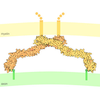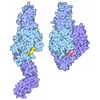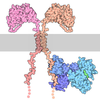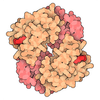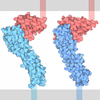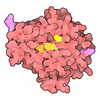[English] 日本語
 Yorodumi
Yorodumi- PDB-1klg: Crystal structure of HLA-DR1/TPI(23-37, Thr28-->Ile mutant) compl... -
+ Open data
Open data
- Basic information
Basic information
| Entry | Database: PDB / ID: 1klg | ||||||
|---|---|---|---|---|---|---|---|
| Title | Crystal structure of HLA-DR1/TPI(23-37, Thr28-->Ile mutant) complexed with staphylococcal enterotoxin C3 variant 3B2 (SEC3-3B2) | ||||||
 Components Components |
| ||||||
 Keywords Keywords | IMMUNE SYSTEM/TOXIN / HLA-DR1/TPI / enterotoxin C3 / human melanoma antigen / CD4+ T cells / IMMUNE SYSTEM-TOXIN COMPLEX | ||||||
| Function / homology |  Function and homology information Function and homology informationmethylglyoxal biosynthetic process / methylglyoxal synthase / methylglyoxal synthase activity / regulation of interleukin-4 production / regulation of interleukin-10 production / myeloid dendritic cell antigen processing and presentation / antigen processing and presentation of endogenous peptide antigen via MHC class II / autolysosome membrane / regulation of T-helper cell differentiation / positive regulation of CD4-positive, CD25-positive, alpha-beta regulatory T cell differentiation ...methylglyoxal biosynthetic process / methylglyoxal synthase / methylglyoxal synthase activity / regulation of interleukin-4 production / regulation of interleukin-10 production / myeloid dendritic cell antigen processing and presentation / antigen processing and presentation of endogenous peptide antigen via MHC class II / autolysosome membrane / regulation of T-helper cell differentiation / positive regulation of CD4-positive, CD25-positive, alpha-beta regulatory T cell differentiation / MHC class II receptor activity / positive regulation of CD4-positive, alpha-beta T cell activation / antigen processing and presentation of peptide or polysaccharide antigen via MHC class II / positive regulation of kinase activity / positive regulation of memory T cell differentiation / positive regulation of T cell mediated immune response to tumor cell / triose-phosphate isomerase / triose-phosphate isomerase activity / positive regulation of monocyte differentiation / inflammatory response to antigenic stimulus / CD4 receptor binding / Gluconeogenesis / glyceraldehyde-3-phosphate biosynthetic process / glycerol catabolic process / canonical glycolysis / Glycolysis / intermediate filament / T-helper 1 type immune response / transport vesicle membrane / Translocation of ZAP-70 to Immunological synapse / Phosphorylation of CD3 and TCR zeta chains / polysaccharide binding / negative regulation of type II interferon production / humoral immune response / macrophage differentiation / Generation of second messenger molecules / immunological synapse / Co-inhibition by PD-1 / epidermis development / detection of bacterium / positive regulation of insulin secretion involved in cellular response to glucose stimulus / T cell receptor binding / negative regulation of T cell proliferation / MHC class II antigen presentation / trans-Golgi network membrane / glycolytic process / gluconeogenesis / protein tetramerization / peptide antigen assembly with MHC class II protein complex / lumenal side of endoplasmic reticulum membrane / negative regulation of inflammatory response to antigenic stimulus / MHC class II protein complex / clathrin-coated endocytic vesicle membrane / ER to Golgi transport vesicle membrane / antigen processing and presentation of exogenous peptide antigen via MHC class II / positive regulation of immune response / peptide antigen binding / positive regulation of T cell activation / structural constituent of cytoskeleton / positive regulation of T cell mediated cytotoxicity / cognition / Interferon gamma signaling / positive regulation of protein phosphorylation / MHC class II protein complex binding / endocytic vesicle membrane / late endosome membrane / Downstream TCR signaling / T cell receptor signaling pathway / toxin activity / early endosome membrane / adaptive immune response / positive regulation of viral entry into host cell / lysosome / positive regulation of ERK1 and ERK2 cascade / positive regulation of canonical NF-kappaB signal transduction / positive regulation of MAPK cascade / immune response / Golgi membrane / external side of plasma membrane / lysosomal membrane / ubiquitin protein ligase binding / positive regulation of DNA-templated transcription / cell surface / signal transduction / protein homodimerization activity / extracellular space / extracellular exosome / extracellular region / metal ion binding / nucleus / membrane / plasma membrane / cytosol Similarity search - Function | ||||||
| Biological species |  Homo sapiens (human) Homo sapiens (human) | ||||||
| Method |  X-RAY DIFFRACTION / X-RAY DIFFRACTION /  SYNCHROTRON / Resolution: 2.4 Å SYNCHROTRON / Resolution: 2.4 Å | ||||||
 Authors Authors | Sundberg, E.J. / Sawicki, M.W. / Andersen, P.S. / Sidney, J. / Sette, A. / Mariuzza, R.A. | ||||||
 Citation Citation |  Journal: J.Mol.Biol. / Year: 2002 Journal: J.Mol.Biol. / Year: 2002Title: Minor structural changes in a mutated human melanoma antigen correspond to dramatically enhanced stimulation of a CD4+ tumor-infiltrating lymphocyte line. Authors: Sundberg, E.J. / Sawicki, M.W. / Southwood, S. / Andersen, P.S. / Sette, A. / Mariuzza, R.A. #1:  Journal: J.Exp.Med. / Year: 1999 Journal: J.Exp.Med. / Year: 1999Title: Biochemical identification of a mutated human melanoma antigen recognized by CD4+ T cells Authors: Pieper, R. / Christian, R.E. / Gonzales, M.I. / Nishimura, M.I. / Gupta, G. / Settlage, R.E. / Shabanowitz, J. / Rosenberg, S.A. / Hunt, D.F. / Topalian, S.L. | ||||||
| History |
|
- Structure visualization
Structure visualization
| Structure viewer | Molecule:  Molmil Molmil Jmol/JSmol Jmol/JSmol |
|---|
- Downloads & links
Downloads & links
- Download
Download
| PDBx/mmCIF format |  1klg.cif.gz 1klg.cif.gz | 142.7 KB | Display |  PDBx/mmCIF format PDBx/mmCIF format |
|---|---|---|---|---|
| PDB format |  pdb1klg.ent.gz pdb1klg.ent.gz | 111.3 KB | Display |  PDB format PDB format |
| PDBx/mmJSON format |  1klg.json.gz 1klg.json.gz | Tree view |  PDBx/mmJSON format PDBx/mmJSON format | |
| Others |  Other downloads Other downloads |
-Validation report
| Arichive directory |  https://data.pdbj.org/pub/pdb/validation_reports/kl/1klg https://data.pdbj.org/pub/pdb/validation_reports/kl/1klg ftp://data.pdbj.org/pub/pdb/validation_reports/kl/1klg ftp://data.pdbj.org/pub/pdb/validation_reports/kl/1klg | HTTPS FTP |
|---|
-Related structure data
- Links
Links
- Assembly
Assembly
| Deposited unit | 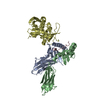
| ||||||||||
|---|---|---|---|---|---|---|---|---|---|---|---|
| 1 |
| ||||||||||
| Unit cell |
|
- Components
Components
| #1: Protein | Mass: 20598.287 Da / Num. of mol.: 1 / Fragment: residues 29-205 Source method: isolated from a genetically manipulated source Source: (gene. exp.)  Homo sapiens (human) / Production host: Homo sapiens (human) / Production host:  |
|---|---|
| #2: Protein | Mass: 22080.664 Da / Num. of mol.: 1 / Fragment: residues 30-219 Source method: isolated from a genetically manipulated source Source: (gene. exp.)  Homo sapiens (human) / Production host: Homo sapiens (human) / Production host:  |
| #3: Protein/peptide | Mass: 1481.713 Da / Num. of mol.: 1 / Fragment: residues 23-37 / Source method: obtained synthetically / Details: peptide synthesis / References: UniProt: P60174*PLUS |
| #4: Protein | Mass: 27721.068 Da / Num. of mol.: 1 / Fragment: residues 29-266 Source method: isolated from a genetically manipulated source Source: (gene. exp.)   |
| #5: Water | ChemComp-HOH / |
| Has protein modification | Y |
-Experimental details
-Experiment
| Experiment | Method:  X-RAY DIFFRACTION / Number of used crystals: 1 X-RAY DIFFRACTION / Number of used crystals: 1 |
|---|
- Sample preparation
Sample preparation
| Crystal | Density Matthews: 4.86 Å3/Da / Density % sol: 74.7 % | ||||||||||||||||||||||||||||||
|---|---|---|---|---|---|---|---|---|---|---|---|---|---|---|---|---|---|---|---|---|---|---|---|---|---|---|---|---|---|---|---|
| Crystal grow | Temperature: 298 K / Method: vapor diffusion, hanging drop / pH: 5.2 Details: PEG 4000, sodium acetate, ethylene glycol, pH 5.2, VAPOR DIFFUSION, HANGING DROP at 298K | ||||||||||||||||||||||||||||||
| Crystal grow | *PLUS | ||||||||||||||||||||||||||||||
| Components of the solutions | *PLUS
|
-Data collection
| Diffraction | Mean temperature: 100 K |
|---|---|
| Diffraction source | Source:  SYNCHROTRON / Site: SYNCHROTRON / Site:  NSLS NSLS  / Beamline: X12C / Wavelength: 0.9785 Å / Beamline: X12C / Wavelength: 0.9785 Å |
| Detector | Type: BRANDEIS - B4 / Detector: CCD / Date: Aug 30, 2001 |
| Radiation | Protocol: SINGLE WAVELENGTH / Monochromatic (M) / Laue (L): M / Scattering type: x-ray |
| Radiation wavelength | Wavelength: 0.9785 Å / Relative weight: 1 |
| Reflection | Resolution: 1.93→15 Å / Num. obs: 52723 / % possible obs: 99.8 % / Observed criterion σ(F): 2 / Biso Wilson estimate: 17.7 Å2 / Rsym value: 0.116 |
| Reflection | *PLUS Highest resolution: 2.4 Å / Lowest resolution: 15 Å / % possible obs: 99.6 % / Num. measured all: 154803 / Rmerge(I) obs: 0.116 |
| Reflection shell | *PLUS Highest resolution: 2.4 Å / Lowest resolution: 2.44 Å / % possible obs: 99.8 % / Rmerge(I) obs: 0.59 / Mean I/σ(I) obs: 1.8 |
- Processing
Processing
| Software |
| |||||||||||||||||||||
|---|---|---|---|---|---|---|---|---|---|---|---|---|---|---|---|---|---|---|---|---|---|---|
| Refinement | Resolution: 2.4→14.96 Å / Rfactor Rfree error: 0.005 / Data cutoff high absF: 159676.13 / Data cutoff low absF: 0 / Isotropic thermal model: RESTRAINED / Cross valid method: THROUGHOUT / σ(F): 2
| |||||||||||||||||||||
| Solvent computation | Solvent model: FLAT MODEL / Bsol: 32.7252 Å2 / ksol: 0.361045 e/Å3 | |||||||||||||||||||||
| Displacement parameters | Biso mean: 33.1 Å2
| |||||||||||||||||||||
| Refine analyze |
| |||||||||||||||||||||
| Refinement step | Cycle: LAST / Resolution: 2.4→14.96 Å
| |||||||||||||||||||||
| Refine LS restraints |
| |||||||||||||||||||||
| LS refinement shell | Resolution: 2.4→2.55 Å / Rfactor Rfree error: 0.018 / Total num. of bins used: 6
| |||||||||||||||||||||
| Xplor file |
| |||||||||||||||||||||
| Refinement | *PLUS Num. reflection Rfree: 2131 / % reflection Rfree: 4 % / Rfactor Rfree: 0.245 / Rfactor Rwork: 0.205 | |||||||||||||||||||||
| Solvent computation | *PLUS | |||||||||||||||||||||
| Displacement parameters | *PLUS | |||||||||||||||||||||
| Refine LS restraints | *PLUS
| |||||||||||||||||||||
| LS refinement shell | *PLUS Lowest resolution: 2.44 Å / Rfactor Rfree: 0.32 / Rfactor Rwork: 0.285 |
 Movie
Movie Controller
Controller



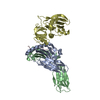
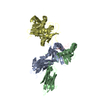
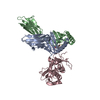

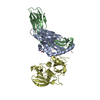
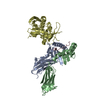
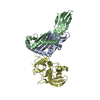
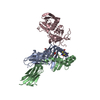
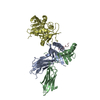

 PDBj
PDBj